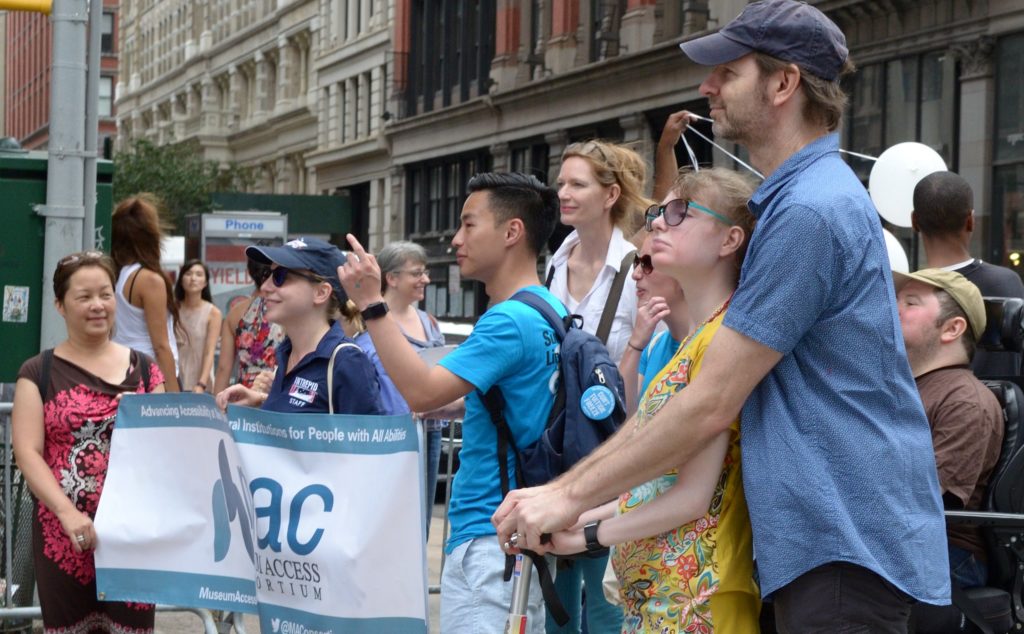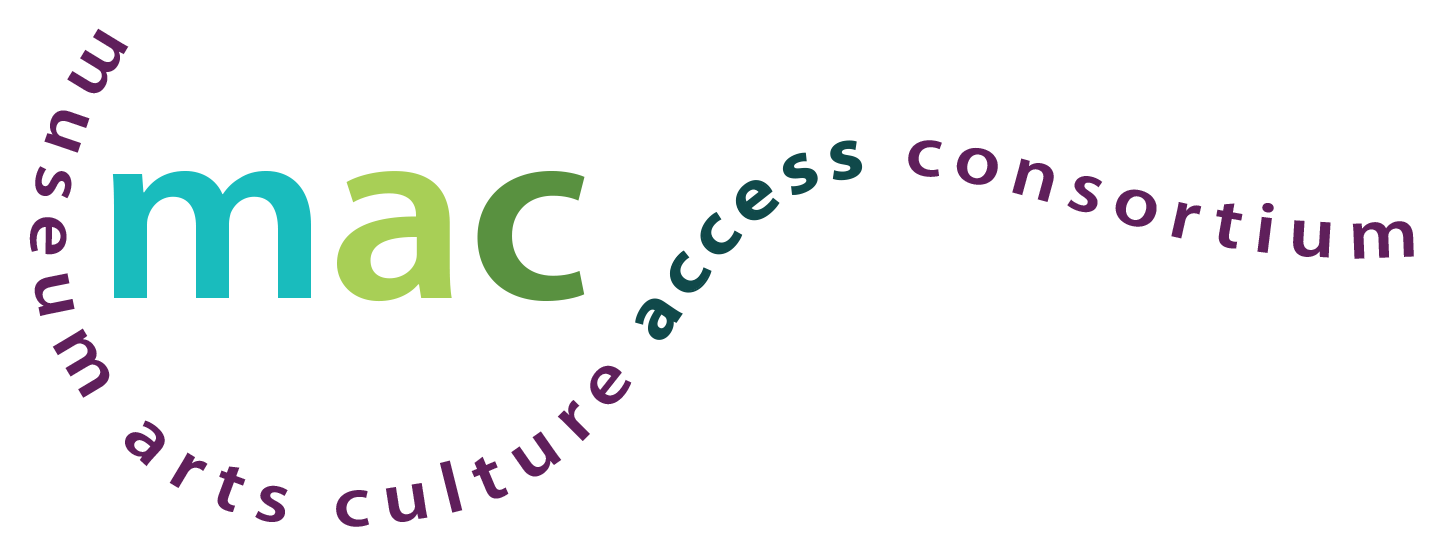26 Nov Supporting Transitions: Cultural Organization Information Resource
Why should my cultural organization join the Supporting Transitions mission?

Members of the Museum Access Consortium march in New York City’s Disability Pride Parade in 2016.
What is Supporting Transitions?
- Supporting Transitions is a project of the Museum Access Consortium (MAC) to increase opportunities for adults with autism spectrum disorder (ASD) at cultural organizations. Through the project MAC provides resources, professional development, and a growing network of support to cultural organizations, autism support organizations, and individuals with autism.
Why is Supporting Transitions important?

-
A participant in The Museum of Modern Art’s Create Ability program shares her artwork with the Create Ability Community.
1 in 68 children have Autism Spectrum Disorder.1 Programs for school age children with autism have created a cohort of teens and adults passionate about arts and culture who are ready to contribute to the field.
About 50,000 young adults with autism exit school each year in the U.S. leading to a loss of community, support services, and structured, daily activities.2
Young adults with ASD have the lowest employment rates compared to other individuals with disabilities.3
The unemployment rate for persons with disabilities was 10.7% in 2015, about twice that of those with no disability (5.1%).4
In 2015, the annual average of people with disabilities employed in arts, design, entertainment, sports, and media occupations was only 1.9%.4
“Nationally, we have a real crisis. About 80% to 90% of young adults with autism are either unemployed or underemployed.”
– Michael Alessandri, Executive Director, University of Miami Center for Autism and Related Disabilities (Upstanders – Employing the Full Spectrum)
Social Responsibility
- Is your organization committed to serving the public?
The public includes adults with autism.
Do you already serve people with disabilities through your programs?
If so, you have a responsibility to have their voice represented as employees.
Does your organization have a diversity hiring initiative?
Diversity includes disability.
The Americans with Disabilities Act (ADA) “prohibits disability discrimination in the full range of employment and personnel practices, such as recruitment, hiring, rates of pay, promotions, and selection for training.”5 Diversity includes both visible and invisible disabilities.

The New York Transit Museum’s employee, hired in collaboration with Birch Family Services, organizes supplies in the museum’s education center.
- Exploring
customized employment
- is also important. It creates opportunities that build on an individual’s strengths in addition to equal opportunity employment.
Support for Supporting Transitions
- Serving individuals with autism could open new funding streams for your organization. Many foundations and agencies are committed to making new opportunities available for adults with autism.
Adult Career and Continuing Education Services-Vocational Rehabilitation (ACCES-VR) creates and supports employment opportunities for individuals with disabilities through programs such as:
- Work Try-Out: Reimburses a new employee’s wages for up to 480 hours in the first 90 days of employment in order to give the employee and employer a chance to assess whether the employee’s skills match the job requirements.
- On-the-Job Training: Reimburses a new employee’s salary for up to 26 weeks, contingent on the complexity of the job and the length of training time needed.
Partnering with Employment Support Programs provide many different forms of support as you embark on a new opportunity with an individual with autism. Many organizations provide job coaching which not only guides candidates through the application process but also helps you best support the employee on the job.
A Win-Win!
- Cultural Organizations are well-positioned to offer adults with autism opportunities for
community
- and
employment
- . The wide range of skills that participation in arts and culture enables individuals with autism to find an entry point
that best suits their strengths and interests
- .

The New York Transit Museum hosts regular events for adults with autism and other developmental disabilities through their Day Habilitation Program days.
- Adults with autism bring unique qualities and
strengths
- that are beneficial to the cultural workplace. They often have deep and specific interests. Autism is as diverse as the rest of the population strengths and interests vary. Employers have experienced many positive qualities in their employees with autism such as:
- Excellent at keeping to routines and systems
- Strong desire to work and contribute
- Very motivated to do a good job
- Highly productive in structured environments
- Lower turnover risk, loyal
- Highly attuned to patterns
- Diverse perspectives
- High enthusiasm
Cultural Organizations offer our society a place to be a part of a community and adults would benefit greatly from building a network of like-minded individuals united by a common interest.
- Sources
- National Institute of Neurological Disorders and Stroke (2016). Last retrieved from http://www.ninds.nih.gov/disorders/autism/detail_autism.htm.
- Life Course Outcomes Research Program, A.J. Drexel Autism Institute, Drexel University (2015). National Autism Indicators Report: Transition into Young Adulthood. Philadelphia, PA: Roux, Anne M., Shattuck, Paul T., Rast, Jessica E., Rava, Julianna A., and Anderson, Kristy, A.
- Newman, L., Wagner, M., Knokey, A., Marder, C., Nagle, K., Shaver, D., & Wei, X. (2011). The post high school outcomes of young adults with disabilities up to 8 years after high school: a report from the National Longitudinal Transition Study-2 (NLTS2). National Center for Special Education Research. Retrieved from http://eric.ed.gov/?id=ED524044.
- DOL’s Bureau of Labor Statistics (2015). Retrieved from http://www.bls.gov/cps/.
- Business and Legal Resources (2016). Retrieved from http://www.blr.com/hrtips/ada.

Sorry, the comment form is closed at this time.